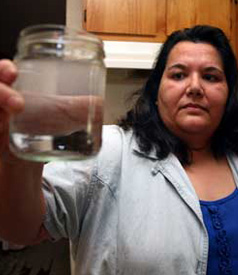Toolville, California – Toolville is a tiny colonia, or unincorporated and informal settlement of about a hundred families, in the rural San Joaquin Valley, just a couple of miles outside the small town of Exeter. Over recent years, Toolville residents have discovered dangerous concentrations of nitrates in their water supply, which is pumped from the aquifer below the homes. As in many San Joaquin Valley communities, overuse of the water table, especially by giant industrial farms, has led to a growing concentration of fertilizer and other ag chemicals in the water that remains.

Toolville’s residents are all working-class people, many of them farm workers. They can use the water from their taps for washing dishes and clothes, but have to buy bottled water for drinking and cooking.


Eunice Martinez, a leader of the community’s effort to gain safe drinking water, looks warily at a jar of water drawn from the tap. Her mother, Margaret, holds their pet Chihuahua at a table where they keep a case of small bottles of drinking water. Across the street from the Martinez house, Natalie and Paco Rojas play in their yard. The health and development of children especially can be harmed by Toolville’s contaminated water.

In her home by the state highway, Cindy Newton-Enloe, who helped start Toolville’s effort to gain safe drinking water, stores her water in big thermos containers and then boils it for tea on her old-fashioned stove.



Valeria Alvarado is a Mixtec immigrant from Oaxaca, and lives in a trailer with her husband, son and three daughters. Her husband is a limonero, or lemon picker, but work is very slow because of the recession. The family has almost no furniture, and struggles to survive from day to day. Valeria washes her dishes in water from the tap, which is pumped from the ground, but buys her drinking water in five-gallon bottles. She stores them in her empty living room and outside the trailer under the porch.

The hills behind Toolville are the foothills of the Sierra Nevadas (Snowy Mountains), and most of the year they’re covered in dry brown grass. At the base of the foothills runs the Friant-Kern Canal, part of the great California Water Project. Its system of dams extends throughout the San Joaquin Valley, channeling the Sierra Nevada runoff into canals, reducing the valley’s former rivers into often dry watercourses, and lowering the water table. The canals provide water exclusively to growers for irrigation. Although the Friant-Kern Canal behind Toolville could supply the community’s water with hardly a noticeable reduction in its flow, Toolville and water-starved colonias like it can’t get access to a single drop.

As many as half a million people live in California’s 220 unincorporated communities, or colonias. Toolville’s water rights movement got the help of California Rural Legal Assistance’ project for Disadvantaged Unincorporated Communities, supported by PolicyLink.
Text and photos © copyright by David Bacon.
David Bacon is a writer and photographer. His new book, “Illegal People – How Globalization Creates Migration and Criminalizes Immigrants,” was just published by Beacon Press. His photographs and stories can be found at https://dbacon.igc.org.
We’re not backing down in the face of Trump’s threats.
As Donald Trump is inaugurated a second time, independent media organizations are faced with urgent mandates: Tell the truth more loudly than ever before. Do that work even as our standard modes of distribution (such as social media platforms) are being manipulated and curtailed by forces of fascist repression and ruthless capitalism. Do that work even as journalism and journalists face targeted attacks, including from the government itself. And do that work in community, never forgetting that we’re not shouting into a faceless void – we’re reaching out to real people amid a life-threatening political climate.
Our task is formidable, and it requires us to ground ourselves in our principles, remind ourselves of our utility, dig in and commit.
As a dizzying number of corporate news organizations – either through need or greed – rush to implement new ways to further monetize their content, and others acquiesce to Trump’s wishes, now is a time for movement media-makers to double down on community-first models.
At Truthout, we are reaffirming our commitments on this front: We won’t run ads or have a paywall because we believe that everyone should have access to information, and that access should exist without barriers and free of distractions from craven corporate interests. We recognize the implications for democracy when information-seekers click a link only to find the article trapped behind a paywall or buried on a page with dozens of invasive ads. The laws of capitalism dictate an unending increase in monetization, and much of the media simply follows those laws. Truthout and many of our peers are dedicating ourselves to following other paths – a commitment which feels vital in a moment when corporations are evermore overtly embedded in government.
Over 80 percent of Truthout‘s funding comes from small individual donations from our community of readers, and the remaining 20 percent comes from a handful of social justice-oriented foundations. Over a third of our total budget is supported by recurring monthly donors, many of whom give because they want to help us keep Truthout barrier-free for everyone.
You can help by giving today. Whether you can make a small monthly donation or a larger gift, Truthout only works with your support.
